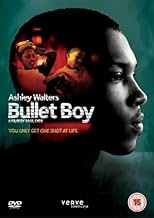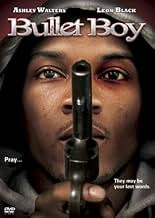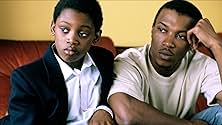CALIFICACIÓN DE IMDb
6.5/10
2.9 k
TU CALIFICACIÓN
Agrega una trama en tu idiomaTwo troubled, street-smart boys, Ricky and Curtis, who struggle to navigate a volatile neighborhood. They face challenges in friendships, family and loyalty, as guns become a reality and boy... Leer todoTwo troubled, street-smart boys, Ricky and Curtis, who struggle to navigate a volatile neighborhood. They face challenges in friendships, family and loyalty, as guns become a reality and boys try to be men before they're teenagers.Two troubled, street-smart boys, Ricky and Curtis, who struggle to navigate a volatile neighborhood. They face challenges in friendships, family and loyalty, as guns become a reality and boys try to be men before they're teenagers.
- Dirección
- Guionistas
- Elenco
- Premios
- 3 premios ganados y 3 nominaciones en total
Clare Perkins
- Beverley
- (as Claire Perkins)
Sharea Samuels
- Shea
- (as Sharea-mounira Samuels)
Jaime Winstone
- Natalie
- (as Jamie Winstone)
- Dirección
- Guionistas
- Todo el elenco y el equipo
- Producción, taquilla y más en IMDbPro
Opiniones destacadas
I wasn't expecting too much of this film before I saw it, but I have to say I was wrong to think it would be dull. Although American audiences -- and, in fact, non-London-dwelling audiences -- probably won't appreciate it for its wonderful depiction of east London, I find myself for once thankful that I live in Hackney. Some scenes around the Hackney Marshes and Lea Valley are astonishingly lush, to the extent that I had my doubts they were actually filmed there, because they present such a contrast to the grubby streets I'm used to, and which are portrayed in other parts of the film.
One of the other things that struck me was the accuracy of the dialogue -- I know this sounds a bit silly, but it's easy to get wrong, and in Bullet Boy there wasn't a word out of place. Lines like "that dog's like my brethren" are faintly amusing, but people do actually speak like that, and Bullet Boy got it exactly right.
I think Bullet Boy is a beautiful film, and have in fact only one gripe besides perhaps its inaccessibility for people who aren't English: the editing-over of a sign at a train station from the station name to 'Platform 2'. I'm an appalling pedant.
One of the other things that struck me was the accuracy of the dialogue -- I know this sounds a bit silly, but it's easy to get wrong, and in Bullet Boy there wasn't a word out of place. Lines like "that dog's like my brethren" are faintly amusing, but people do actually speak like that, and Bullet Boy got it exactly right.
I think Bullet Boy is a beautiful film, and have in fact only one gripe besides perhaps its inaccessibility for people who aren't English: the editing-over of a sign at a train station from the station name to 'Platform 2'. I'm an appalling pedant.
I would like to start off saying that I appreciated the movie for dealing with the black community in London. No rude cockney gangsters, catchy crime scams or laughably stupid dope dealers. The family this movie deals with is a single mum home with two sons, one just out of prison, the other still too young to be involved in anything hazardous, but looking up at his brother and already copying some of his ways.
I enjoyed the language and the characters who were all convincing and complex enough but, how carefully put down they were, the more obvious and stereotypical were the things happening to them. Everything going from bad to worse, who plays with fire is gonna get burnt. And then the ultimate contrast of either sinking into crime and sin (devil), or choosing the righteous path and go to church every Sunday (god).
This easy moralism hurt the rest of the film. It made things predictable. It was like a newspaper article collage, one shock after the other. It took away much of the complexity that I found in the characters themselves. It really is a shame because the development of the characters could have been much more subtle and would have fit in better with the style of the movie that deals with a gritty context matter but managed to use a soft and sometimes almost dreamy camera and score, not unlike other recent British films, such a 'Morvern Callar' and '16 Years of alcohol'.
I enjoyed the language and the characters who were all convincing and complex enough but, how carefully put down they were, the more obvious and stereotypical were the things happening to them. Everything going from bad to worse, who plays with fire is gonna get burnt. And then the ultimate contrast of either sinking into crime and sin (devil), or choosing the righteous path and go to church every Sunday (god).
This easy moralism hurt the rest of the film. It made things predictable. It was like a newspaper article collage, one shock after the other. It took away much of the complexity that I found in the characters themselves. It really is a shame because the development of the characters could have been much more subtle and would have fit in better with the style of the movie that deals with a gritty context matter but managed to use a soft and sometimes almost dreamy camera and score, not unlike other recent British films, such a 'Morvern Callar' and '16 Years of alcohol'.
This film was painful to sit through. Went to the screening at the London film festival and couldn't believe the stereo typical representations with dialogue so bad (it made me cringe) I couldn't understand how the film council can spend tax payers money on something so pointless.
I went with two black friends of mine to see the film. For a film that's supposed to be of serious nature they laughed all the way through it as if it was a comedy. I assumed I wasn't getting the jokes but later found out they were laughing at it rather than with it.
It was obvious that the executives at film council have none or very little knowledge about the black community in London. I've worked with many black children/ youth and I couldn't recognise many of the characters that appeared on the film.
I wasn't surprised to find out that the producers of this very awful film are actually executives at the film council. NO WONDER. This isn't a film I recommend even when it's on TV.
I went with two black friends of mine to see the film. For a film that's supposed to be of serious nature they laughed all the way through it as if it was a comedy. I assumed I wasn't getting the jokes but later found out they were laughing at it rather than with it.
It was obvious that the executives at film council have none or very little knowledge about the black community in London. I've worked with many black children/ youth and I couldn't recognise many of the characters that appeared on the film.
I wasn't surprised to find out that the producers of this very awful film are actually executives at the film council. NO WONDER. This isn't a film I recommend even when it's on TV.
Saul Dibb's debut feature stars So Solid's Ashley 'Asher D' Walters as Ricky, a parolee returning to Hackney's infamous murder mile. He is hoping to remain on the straight and narrow but this proves difficult as he's re-encompassed by the same violent climate he left and the need to maintain honour while preserving his reputation is the code to live by.
There is little to fault this British Movie. Shot on 16mm and on a tight budget of ca.48k, what we are given is a fly-on-the-wall view of life on the streets and the futility of Britain's gun culture. This didn't have to be shot in Hackney, but anywhere would have suited the scenario of disadvantaged youths trying to keep their heads above water in the increasingly gangsterish streets of Britain.
Dibb, the director, is very careful not to preach to us. The closet similarities and comparisons made will point an out-dated and clichéd finger at John Singleton's 'Boyz in da Hood' and Spike Lee's 'Do The Right Thing'. Although these two films crystallised (inner) racial feuding and violence in America, Dibb keeps his message a little closer to his chest as the audience decide who's the true hero, villain or victim - if any. This film plays as a theatrically scripted tragedy, which is sensed from the opening where the young Curtis (Luke Fraser) goes to meet his paroled brother.
It is hard to pinpoint the film's genre and exactly what the plot is. Largely unknown actors, a purpose-built raggedy script (with plenty of improv) revolving on just-happen-to-be circumstances leads to a sense of a horrific reality. Here, kids try to become men too young, and violence is the sole key to respect even if it is borne from a childish dispute like a minor traffic incident as in the film.
It works and it works very well. All character development is sidelined for a streamed view of street life. Clare Perkins plays the mother who has no control over her boys despite her strenuous efforts, the reformed Preacher (Curtis Walker) and Wisdom (Leon Black) all have their own back story, which we are told in a sentence, focusing our attentions on the Brothers. Each character represents a social template in one of life's cycles, Ricky and Wisdom are the present and his younger brother could easily be the future while the rest of the cast represent those inadvertently embroiled in street politics and gun ethics.
Massive Attack's Robert Del Naja delivers a haunting theme to end the movie, as the filmmakers ask no questions but leave them in sight. Dibb, who is traditionally a documentary maker is all too aware of how to enter the psyche of gritty subject matter with previous works on street life and shop lifting he wants us to see all the angles, the choices these people make and their consequences. It is then up to us to draw our own conclusions.
Ricky wants to be the ideal brother for Curtis but the street will not let him. He wants to knock some sense into his over zealous friend Wisdom but loyalty won't let him. Curtis is a lovable character because he has the innocence of youth, which his environment is too eager to snatch as (peer) pressures encroach on him and his brother's good intentions are contrasted by the actuality of his actions. Curtis is the natural choice to become a Bullet Boy, like others around him and the responsibility is left to the one character that should traditionally have none.
This is a powerful fete in film-making and serves topic matter that is relevant and garnished with gritty realism that you cannot help but feel for all those involved.
There is little to fault this British Movie. Shot on 16mm and on a tight budget of ca.48k, what we are given is a fly-on-the-wall view of life on the streets and the futility of Britain's gun culture. This didn't have to be shot in Hackney, but anywhere would have suited the scenario of disadvantaged youths trying to keep their heads above water in the increasingly gangsterish streets of Britain.
Dibb, the director, is very careful not to preach to us. The closet similarities and comparisons made will point an out-dated and clichéd finger at John Singleton's 'Boyz in da Hood' and Spike Lee's 'Do The Right Thing'. Although these two films crystallised (inner) racial feuding and violence in America, Dibb keeps his message a little closer to his chest as the audience decide who's the true hero, villain or victim - if any. This film plays as a theatrically scripted tragedy, which is sensed from the opening where the young Curtis (Luke Fraser) goes to meet his paroled brother.
It is hard to pinpoint the film's genre and exactly what the plot is. Largely unknown actors, a purpose-built raggedy script (with plenty of improv) revolving on just-happen-to-be circumstances leads to a sense of a horrific reality. Here, kids try to become men too young, and violence is the sole key to respect even if it is borne from a childish dispute like a minor traffic incident as in the film.
It works and it works very well. All character development is sidelined for a streamed view of street life. Clare Perkins plays the mother who has no control over her boys despite her strenuous efforts, the reformed Preacher (Curtis Walker) and Wisdom (Leon Black) all have their own back story, which we are told in a sentence, focusing our attentions on the Brothers. Each character represents a social template in one of life's cycles, Ricky and Wisdom are the present and his younger brother could easily be the future while the rest of the cast represent those inadvertently embroiled in street politics and gun ethics.
Massive Attack's Robert Del Naja delivers a haunting theme to end the movie, as the filmmakers ask no questions but leave them in sight. Dibb, who is traditionally a documentary maker is all too aware of how to enter the psyche of gritty subject matter with previous works on street life and shop lifting he wants us to see all the angles, the choices these people make and their consequences. It is then up to us to draw our own conclusions.
Ricky wants to be the ideal brother for Curtis but the street will not let him. He wants to knock some sense into his over zealous friend Wisdom but loyalty won't let him. Curtis is a lovable character because he has the innocence of youth, which his environment is too eager to snatch as (peer) pressures encroach on him and his brother's good intentions are contrasted by the actuality of his actions. Curtis is the natural choice to become a Bullet Boy, like others around him and the responsibility is left to the one character that should traditionally have none.
This is a powerful fete in film-making and serves topic matter that is relevant and garnished with gritty realism that you cannot help but feel for all those involved.
I saw this film last night at the Tricycle theatre and I have to say it showed the real look at 'road' life as we know it for our young black brothers. Being Black British myself I really felt the film through the eyes of the mother, Ricky and Curtis, it was a brilliant watch. You may call it typical of movies, but this was a British film with edge and class at getting the message right! I was brought to tears on the way home remembering how many of our brothers are going through and have been through (RIP) this similar scenario, so I know why I appreciate being a mentor to uplift my community
¿Sabías que…?
- TriviaShot largely within one square mile on the edge of Hackney.
- ErroresWhen Rio and Leon are playing hide and seek, the boom microphone is visible in the lower left corner screen for a second.
- ConexionesFeatured in Louis Theroux Interviews...: Ashley Walters (2023)
Selecciones populares
Inicia sesión para calificar y agrega a la lista de videos para obtener recomendaciones personalizadas
- How long is Bullet Boy?Con tecnología de Alexa
Detalles
- Fecha de lanzamiento
- País de origen
- Sitio oficial
- Idioma
- También se conoce como
- The Boys
- Locaciones de filmación
- Productoras
- Ver más créditos de la compañía en IMDbPro
Taquilla
- Presupuesto
- GBP 1,000,000 (estimado)
- Total a nivel mundial
- USD 572,990
- Tiempo de ejecución
- 1h 29min(89 min)
- Color
- Mezcla de sonido
- Relación de aspecto
- 2.35 : 1
Contribuir a esta página
Sugiere una edición o agrega el contenido que falta

























